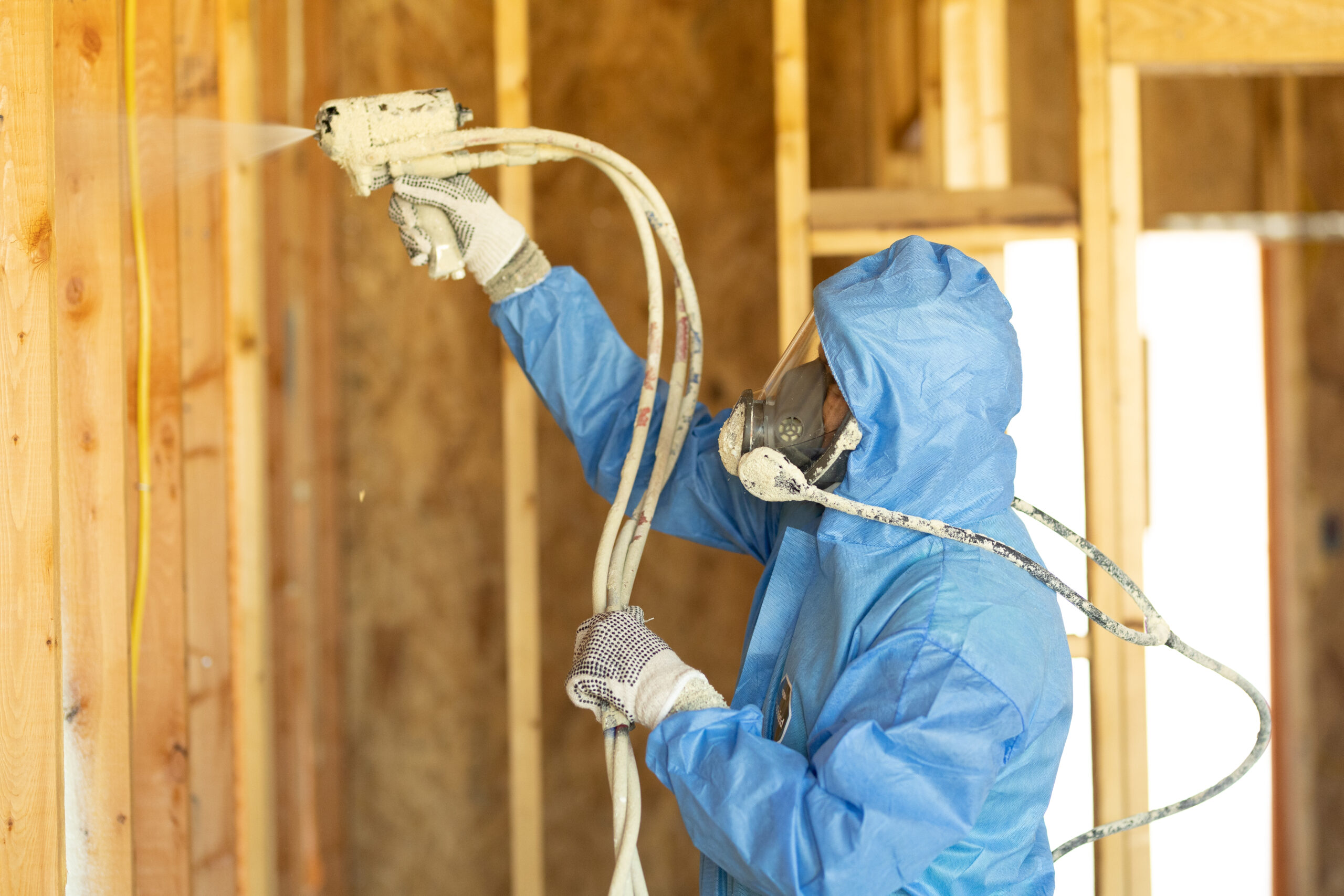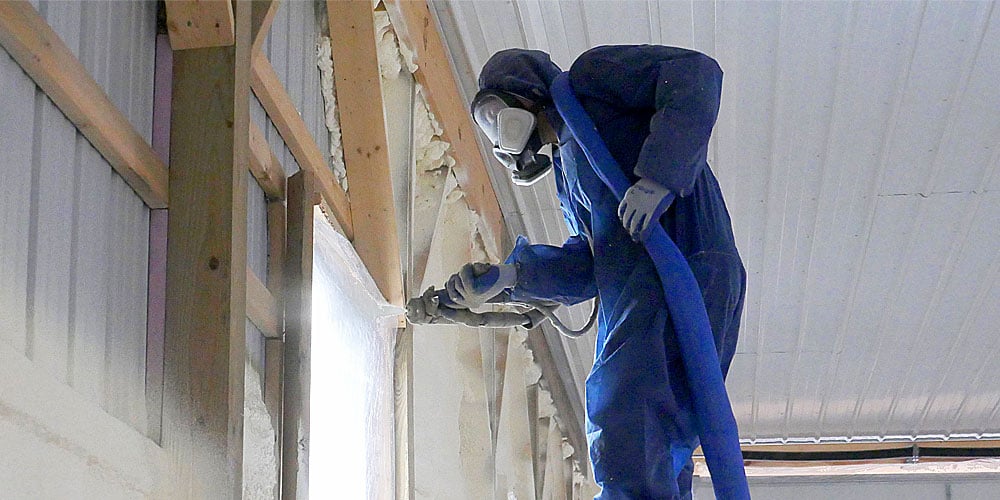Tips for Preserving Your Spray Foam Insulation for Long-Term Efficiency
Tips for Preserving Your Spray Foam Insulation for Long-Term Efficiency
Blog Article
Spray Foam: The Ultimate Remedy for Air Sealing and Insulation
Spray foam insulation has emerged as a leading solution for reliable air securing and thermal insulation, providing a special combination of residential properties that set it apart from standard techniques. Understanding the complete range of its advantages, installation processes, and contrasts with various other insulation types is critical for making informed choices.
What Is Spray Foam?
Spray foam is a versatile insulation product that incorporates the concepts of air sealing and thermal resistance to improve energy efficiency in buildings. Made up mostly of polyurethane or other similar compounds, spray foam is used as a fluid that increases upon contact with surfaces, developing a strong, constant layer of insulation. This one-of-a-kind home permits it to fill voids, splits, and voids that traditional insulation materials might forget, providing a remarkable air seal.
There are two main kinds of spray foam: open-cell and closed-cell. Open-cell spray foam is lighter and more flexible, supplying excellent audio absorption and a reduced R-value per inch - Spray Foam. On the other hand, closed-cell spray foam is denser, supplying a greater R-value, moisture resistance, and included architectural honesty to developing elements
The application process usually involves specific tools, ensuring a smooth application that complies with various substratums, including steel, wood, and concrete. This flexibility makes spray foam ideal for both new buildings and retrofitting existing frameworks. Its capability to produce an impermeable barrier substantially adds to minimizing power usage and boosting interior air quality, therefore making it a preferred option among building contractors and property owners alike.
Advantages of Spray Foam Insulation
One of the most significant advantages of spray foam insulation is its phenomenal capability to develop a constant air obstacle, which effectively lessens energy loss. Unlike standard insulation materials, spray foam expands to load cracks and voids, guaranteeing that air leak is drastically reduced. This characteristic not just enhances power efficiency yet also brings about decrease utility bills gradually.
Furthermore, spray foam insulation supplies premium thermal resistance, adding to an extra steady interior atmosphere. Its high R-value per inch permits for effective insulation in constrained areas, making it perfect for attics, wall surfaces, and crawl spaces. The moisture-resistant residential or commercial properties of spray foam help stop mold and mildew and mildew development, promoting healthier living conditions.
An additional important advantage of spray foam insulation is its sound-dampening top qualities (Spray Foam). It successfully decreases noise transmission between areas, developing a quieter and more comfy home atmosphere. The toughness of spray foam likewise sticks out, as it does not droop or work out gradually, maintaining its performance throughout its lifespan
Just How Spray Foam Functions
Understanding how spray foam insulation functions is necessary for appreciating its effectiveness in air securing and thermal resistance. Spray foam insulation is composed of 2 primary parts: isocyanate and polyol resin. When these parts are combined, they undertake a chain reaction that causes the material to broaden swiftly, producing a dense foam that fills up fractures, voids, and dental caries.
As the foam expands, it sticks to surfaces, forming a closed seal that significantly reduces air seepage. This particular makes spray foam insulation extremely efficient at protecting against drafts and dampness penetration, which can lead to power loss and damages with time. In addition, the closed-cell variant of spray foam offers remarkable thermal resistance because of its inflexible framework, efficiently decreasing heat transfer.
The distinct properties of spray foam allow it to comply with irregular surface areas, making sure thorough protection and a seamless barrier. As an outcome, spray foam insulation not just enhances power effectiveness but additionally adds to enhanced indoor air high quality by decreasing the site here accumulation of irritants and pollutants. Inevitably, comprehending the mechanics behind spray foam highlights its role as an exceptional selection for insulation and air sealing in both industrial and property applications.
Installment Process Introduction

Before installation, the room needs to be properly cleaned up and prepped, making certain that surface areas are complimentary from dirt, wetness, and debris. This action is crucial because pollutants can endanger adhesion and overall efficiency. As soon as the area is prepared, the application includes blending the two parts of the spray foam, which expands upon get in touch with and fills gaps properly.
Trained specialists ought to perform the installment, making use of customized equipment to make certain consistent protection and optimum density. Safety precautions, including using protective equipment and making certain proper air flow, are important during this procedure. After application, the foam generally treatments rapidly, creating a strong obstacle that improves power effectiveness.
Comparing Spray Foam to Typical Insulation
When examining insulation options, spray foam insulation stands out in comparison to typical products such as fiberglass and cellulose. Unlike fiberglass and cellulose, which can enable air infiltration, spray foam broadens upon application, filling spaces and gaps to produce an impermeable seal.
In addition, spray foam gives a greater R-value per inch than standard insulation types, offering more effective thermal resistance in a thinner account. This particular is specifically advantageous in areas with limited dental caries deepness. Spray foam is immune to dampness and mold and mildew growth, which can be a substantial worry with cellulose and fiberglass, specifically in moist settings.
Nonetheless, spray foam insulation commonly carries a higher upfront cost than its traditional equivalents. Home owners need to evaluate this initial financial investment against long-lasting energy savings and efficiency benefits. Ultimately, while both insulation kinds offer their objective, spray foam becomes an advanced service for modern insulation needs, particularly in terms of air sealing and thermal efficiency.

Verdict
In summary, spray foam insulation stands for a very reliable service for achieving optimum air sealing and thermal resistance. Its unique buildings, including wetness resistance and sound dampening, make it suitable for numerous applications in both new building and constructions and retrofitting jobs (Spray Foam). Although the first expenses might be greater contrasted to traditional insulation materials, the long-lasting advantages, such as substantial power savings and improved interior air high quality, validate the investment and highlight its value in modern-day structure methods.
Spray foam insulation has actually emerged as a leading option for efficient air securing and thermal insulation, using a special mix of buildings that set it apart from typical techniques.Spray foam is a versatile insulation product that integrates the principles of air securing and thermal resistance to enhance power efficiency in structures.When reviewing Recommended Reading insulation choices, spray foam insulation stands out in contrast to traditional products such as fiberglass and cellulose. Eventually, while both insulation types serve their objective, spray foam arises as a more innovative service for modern-day insulation needs, especially in terms of air securing and thermal efficiency.
In recap, spray foam insulation stands for a highly efficient remedy for achieving ideal air securing and thermal resistance.
Report this page